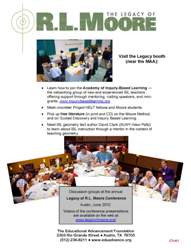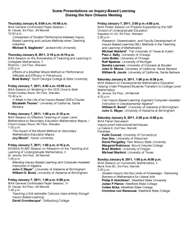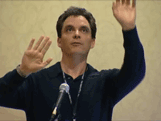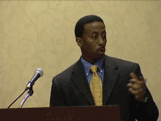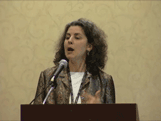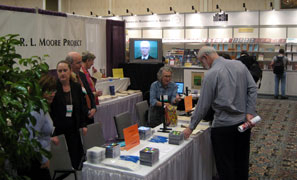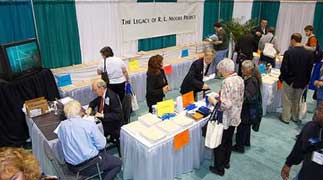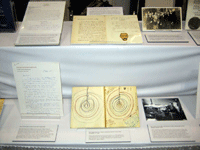History of Science Society Annual Meeting, Cleveland, Ohio, 3 –6 Nov. 2011
The Legacy project sponsored a lunch meeting for the Forum for the History of the Mathematical Sciences attended by twenty-six..
14th Annual Legacy of R.L. Moore Conference, Washington DC, 2–4 June 2011
Images from 2011 Legacy Conference, |
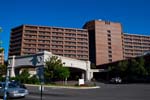 |
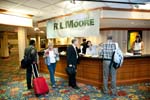 |
 |
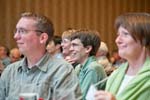 |
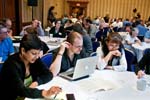 |
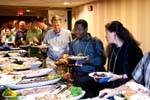 |
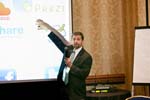 |
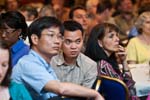 |
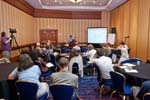 |
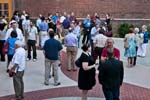 |
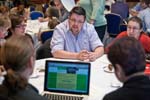 |
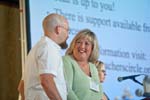 |
 |
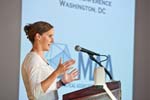 |
The conference, the first co-hosted by the Mathematical Association of America, was also the first to be held outside of Austin.
The MAA has reported on the conference experience and on what turned out to be a principal theme: transforming lives.
It was the occasion for presenting some initial results based on the data collected by the three-year project assessing student outcomes in inquiry-based learning classes at four major research universities. More on the assessment project, conducted by the University of Colorado at Boulder Ethnography & Evaluation Research unit, can be found at the Colorado web site.
See the detailed program schedule, abstracts, and presenters' slides and also videos of presentations.
American Mathematical Society – Mathematical Association of America Joint Annual Meetings, New Orleans, 6–9 January 2011
The Legacy project sponsored exhibit booths where volunteer attendants, such as Project NExT fellows and IBL practitioners -- led by Jean and Lee Mahavier -- distributed free literature and videos relating to inquiry-based learning.
Click on the image below to view our flyer for the meeting:
History of Science Society Annual Meeting, Montréal, Quebec, 4 –7 Nov. 2010
Forum for the History of the Mathematical Sciences luncheon: Some two dozen people interested in the history of mathematics came to this gathering, sponsored by the Legacy of R.L. Moore Project. The new Forum group has already had an impact on raising the profile of mathematics within the society's meetings.
13th Legacy of R.L. Moore Conference, Hyatt Regency, Austin, TX, 17 –19 June 2010
For nearly half of the over two-hundred and fifty conference attendees this was their first Legacy conference. The program reflected more emphasis on inquiry-based learning at the K-12 level than previous conferences though the focus remained as usual on university mathematics and teacher training.
The conference followed a three-day inquiry-based learning workshop in Austin for twenty teachers.
videos of the conference presentations.
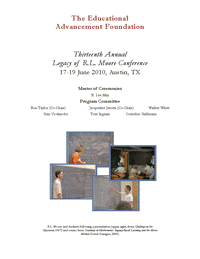
American Mathematical Society – Mathematical Association of America Joint Annual Meetings, San Francisco, 13 –16 January 2010
The exhibit booth, under the banner of the new Legacy logo, proved popular. More than twenty people signed up for the Academy of Inquiry Based Learning. The traditional presence of Bill and Jean Mahavier was missed -- San Francisco was too far to travel. Several Project NExT volunteers joined EAF staff, however, in helping meet visitors and answer questions.
The Legacy reception for Project NExT was attended by some 70 people including guests who said a few words about inquiry-based learning, the Moore Method, or the Academy of Inquiry Based Learning: David Bressoud, Joe Gallian, Katherine Socha, Mike Starbird, and Aparna Higgins.
There were individual speakers and a whole session devoted to IBL topics. Most of these are listed in the flyer below.
Flyer for registration packets (click for PDF version):
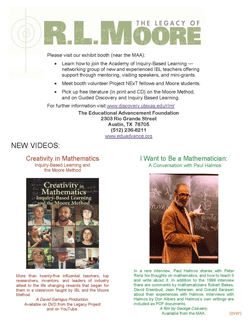 |
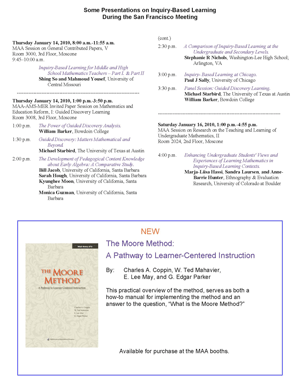 |
History of Science Society Annual Meeting, Phoenix, AZ, 19 –22 Nov. 2009
The Legacy project sponsored a lunch meeting for the recently organized History of Mathematics Forum.
12th Annual Legacy of R.L. Moore Conference, Austin, TX, 16–18 July 2009.
Location: Hyatt Regency Austin Hotel
Theme: Inquiry-Based Learning in Different Contexts
Link to program details, including timetable.
Link to video of the conference and abstracts of presentations.
Plenary speakers included:
David Bressoud, President, Mathematical Association of America, and Professor, Macalaster College.
Title: Teaching the Art of Guessing.
Abstract:
If we want to attract more students to mathematics, then we need courses that engage and surprise them, that convince them that mathematics is interesting and worthy of exploration. I will share some of the lessons I have learned from George Pólya and others about how to accomplish this by focusing on the art of guessing.
Tim Chartier, Assistant Professor, Davidson College.
Chartier received the Henry L. Alder Award in 2007 "as one of three top new mathematics teachers nationwide for his outstanding exposition in print, in classrooms, and in pantomime."
Mel George, Professor Emeritus of Mathematics, University of Missouri-Columbia; President Emeritus of St.Olaf College; and President Emeritus of the University of Missouri.
Chief author of Shaping the Future for the National Science Foundation (1996) and chair of the Blue Ribbon Committee for the NSF Centers for Learning and Teaching program. He has been a member of several National Research Council boards and committees and was Vice-Chair of the NRC committee that wrote the report From Analysis to Action. He has been active in Project Kaleidoscope for many years, helping to train leaders in undergraduate STEM education.
Ted Mahavier, Associate Professor, Lamar University.
Founder and Senior Editor, Journal of Inquiry-Based Learning in Mathematics. Co-author with Charles A. Coppin, G. Edgar Parker, and E. Lee May, The Moore Method: A Pathway to Student-Centered Instruction, (to be published by the MAA).
William A. Sommers, Leadership Coach, consultant and author.
Title: Why Students Don't Like School: So, What Do We Do About It?
Abstract:
"Not learning is bad; not wanting to learn is worse" -- African Proverb.
Data continues to show that too many students are not graduating from high school. The numbers of students graduating from college and universities is also low. Why is that? What are some of the barriers that get in the way of learning? We will discuss ways we engage students differently to increase learning in school. Connections to current brain research will be made. Intelligence is NOT fixed. We all can continue to grow cognitively.
Sommers is the former Director of Leadership and Organizational Development for Manor ISD in Texas, the former Executive Director for Secondary Curriculum and Professional Learning for Minneapolis Public Schools, and a school administrator for over 30 years.
Diane Spresser, Professor Emerita, James Madison University; consultant in the Directorate for Education and Human Resources, National Science Foundation.
Title: If It’s a Good Partnership, Then It Works!
Abstract:
We reflect on
(a) supportive partnerships between IBL-faculty/teachers and the administrators with whom they work,
(b) departmental-level partnerships that include peer faculty/teachers and students, and
(c) ways to demonstrate the effectiveness of IBL.
Dr. Spresser was a faculty member in the Department of Mathematics (and Computer Science) at JMU for twenty-seven years, including sixteen as department head, during which the department’s first Moore-method faculty member was hired. (See her account: "The Moore Method: Viewpoint of a Department Chair.") She joined the NSF in 1994 as Program Director for Teacher Enhancement– Mathematics and subsequently served as an Acting Division Director. For the approximately five years preceding her retirement from NSF in 2007, she headed the Foundation’s Math and Science Partnership program. A graduate of the University of Virginia, Dr. Spresser’s mathematical interests are in discrete mathematics, especially graph theory and algorithms
Program details, including timetable.
American Mathematical Society – Mathematical Association of America Joint Annual Meetings, January 2009
The Legacy project invited attendees to its exhibit booths for free literature and videos relating to inquiry-based learning. As a new feature, visitors were greeted by volunteer Project NExT fellows as well as Educational Advancement Foundation staff and Jean and Bill Mahavier.
The Project hosted its reception for Project NExT Fellows on Tuesday, 6 January. Speakers included Joe Gallian, Mike Starbird, and Christine Stevens. Their words were brief but so well received that the only regret is that they were not recorded.
On Thursday, 8 January, there were two special sessions of note on Inquiry-Based Learning:
(CLICK ON TITLES FOR ABSTRACTS)
Organizers:
William B. Jacob, University of California Santa Barbara
Paul J. Sally, University of Chicago
Ralf J. Spatzier, University of Michigan
Michael Starbird, University of Texas at AustinThursday January 8, 2009, 8:00 a.m.–10:45 a.m.
- 8:00 a.m.
IBL Analysis at The University of Texas.
Edward Odell*, The University of Texas at Austin
- 8:30 a.m.
Inquiry about Inquiry: Use of case studies to develop mathematical ideas in courses for pre-service teachers.
Bill Jacob*, University of California, Santa Barbara
- 9:00 a.m.
Inquiry-Based Learning Opportunities for Secondary Teachers and Students.
Bret Benesh, College of Saint Benedict
Andrew Engelward, Harvard University
Thomas W Judson*, Stephen F. Austin University
Matthew Leingang, New York University
- 9:30 a.m.
Outreach IBL at the University of Chicago.
Paul J. Sally*, University of Chicago
- 10:00 a.m.
DiscussionThursday January 8, 2009, 1:00 p.m.-5:50 p.m.
- 1:00 p.m.
Inquiry Based Learning at University of Michigan.
Ralf J Spatzier*, University of Michigan
- 1:30 p.m.
Two very different Inquiry Based Learning courses at the University of Michigan.
Morton Brown*, University of Michigan
- 2:00 p.m.
Upper-level undergraduate IBL mathematics classes at the University of Chicago.
John D. Boller*, University of Chicago
- 2:30 p.m.
Real Analysis---an inquiry-based approach.
Carol S Schumacher*, Kenyon College
- 3:00 p.m.
Restraint and Coverage: A Characterization of Instructor Change.
Stan T Yoshinobu*, Cal State Dominguez Hills
- 3:30 p.m.
Student-to-Student Discussions: The Roles of the Instructor and Students in Discussions in an Inquiry-Oriented Transition to Proof Course.
Stephanie R Nichols*, Anoka-Ramsey Community College
- 4:00 p.m.
Inquiring about Inquiry: Progress on Research and Evaluation Studies of Inquiry-Based Learning in Undergraduate Mathematics at Four Campuses.
Sandra L. Laursen*, University of Colorado, Boulder
Marja-Liisa Hassi, University of Colorado, Boulder
- 4:30 p.m.
Incorporating Inquiry-Based Learning in the Calculus Sequence: A Most Challenging Endeavour.
M. Padraig McLoughlin*, Kutztown University of Pennsylvania
- 5:00 p.m.
IBL in Freshman Calculus at the University of Chicago.
Diane Herrmann*, University of Chicago
- 5:30 p.m.
Guided Discovery: Teaching Mathematics/Transforming Lives.
Michael Starbird*, The University of Texas at Austin
 11th Annual Legacy of R.L. Moore Conference, Austin, TX, 10–12 July 2008.
11th Annual Legacy of R.L. Moore Conference, Austin, TX, 10–12 July 2008.
"Improving Inquiry-Based Learning Classroom Practices and Outreach"
The conference gave a particular emphasis on how to assist those who may be considering using IBL. Participants had the opportunity to engage in “round table” discussions. The program is available, and photos and video clips will be accessible here soon.
From a participant:
"I believe that the conference has affected my teaching more than any other professional development activity I have ever done."
American Mathematical Society - Mathematical Association of America Joint Annual Meetings, San Diego, CA, 5–9 January 2008
The Legacy exhibit booth attracted both new and familiar friends. A special thanks goes to Bill and Jean Mahavier for their usual invaluable service in helping the Educational Advancement Foundation staff in maintaining the stock of handouts and in answering visitors' queries.
The Legacy Project sponsored another reception for Project NExT fellows which was perhaps the best attended to date. MAA president Joe Gallian dropped by to welcome the group.
Tenth Annual Legacy of R. L. Moore Conference, Austin, Texas, 12–14 April 2007
The 10th conference took place in Austin at the Marriott Courtyard Austin Downtown. Program.
As with previous conferences most of the program was video recorded. The producer, Banning K. Lary, also prepared sample clips which are available here.
Above are Tim Chartier (in clip #11), Dante Tawfeeq (#3), and Laurie Cavey (#3).
American Mathematical Society - Mathematical Association of America Joint Annual Meetings, New Orleans, LA, 5–8 January 2007
The Legacy of R.L. Moore booths proved to be a popular attraction once again and visitors included people to whom the Moore Method and Inquiry-Based Learning were new. The Educational Advancement Foundation sponsored a luncheon for representatives from the Associated Colleges of the South. Twenty-six faculty from thirteen colleges attended; Barry Spieler and Bob Eslinger briefly described the programs of ACS and the Legacy of R.L. Moore Project. The Legacy Project also sponsored a reception for Project NExT fellows.
EAF founder, Harry Lucas, Jr., was inducted into the Mathematical Association of America's Icosahedron Society which honors significant contributors to MAA programs.
Ninth Annual Legacy of R. L. Moore Conference, Austin, Texas, 11–13 May 2006
The 9th conference took place in Austin at the Renaissance Austin Hotel. The program included talks by Ian Knowles ("Two Decades of Advanced Calculus at the University of Alabama - Birmingham: Robert Kauffman and the Moore Method"), Hugh Montgomery ("Discovering Number Theory"), and Alan Cline ("Paul Halmos and the Moore Method"). There was a session devoted to the mathematics and teaching career of Hubert S. Wall (1902-1971) a long-time colleague of R.L. Moore and author of the books Creative Mathematics and Analytic Theory of Continued Fractions.
| American Mathematical Society - Mathematical Association of America Joint Annual Meetings, San Antonio, Texas, 12-15 January 2006 | |
At its exhibit booths The Legacy of R. L. Moore Project provided gratis literature and videos relating to Professor Moore and the Moore Method.
|
There was also an exhibit of materials from the Archives of American Mathematics featuring items illustrating its wide range of collections. |
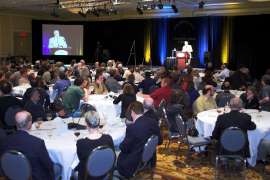 |
From 28 April to 1 May 2005, the Educational Advancement Foundation in conjunction with the University of Texas at Austin held the Eighth Annual Legacy of R. L. Moore Conference. The program is available here. |
As in previous years, at the 2005 meeting each table had microphones that allowed any of the 200 attendees at interactive sessions to join an electronic queue and speak from the floor. |
Visit the gallery of photographs of participants. |
At the meeting of the National Council of Teachers of Mathematics, Anaheim, California, 6–9 April 2005, Ronald G. Douglas (Texas A&M University, College Station, Texas) gave a talk entitled "National Consortium on Inquiry-Based Learning." Abstract: In recent years, interest in inquiry-based learning (IBL), developed by R. L. Moore to teach college level mathematics, has grown. The Educational Advancement Foundation is sponsoring the creation of national centers at several major universities to develop and foster the "Moore Method" in mathematics teaching. The presenter will give an overview of the center project and stress opportunities at the centers for teachers to participate in conferences and in-service programs involving IBL.
On 18-20 November 2004 there was a special session at the History of Science Society annual meeting in Austin devoted to "Tracing the Development of Mathematics in Early Twentieth-Century America: Three Case Studies Drawn from the Archives of American Mathematics, Austin." It included talks by Albert C. Lewis (Halsted and Mathematics on the American Frontier); Della D. Fenster (Leonard Dickson: the Man Out of Texas But not the Texas Out of the Man); David E. Zitarelli (The Moore-Kline Correspondence: Portrait of Two Mathematicians). It was organized by Karen Parshall of the University of Virginia and chaired by Joseph Dauben, The Graduate Center, CUNY.
The Legacy of R. L. Moore project was the principal sponsor of the Society's reception at the Harry H. Ransom Humanities Research Center. The full program and abstracts of talks are expected to appear under "Future and Past meetings" at the Society web site.
On March 12-14, 2004, the Educational Advancement Foundation in conjunction with the University of Texas, held the Seventh Annual Legacy of R. L. Moore Conference. The program is available here.
On March 13-15, 2003, the Educational Advancement Foundation, in conjunction with The University of Texas at Austin, held the Sixth Annual Legacy of R.L. Moore Conference. The program is available here.
At the Ninth Midwest History of Mathematics Conference, 4-5 October 2002, David Zitarelli of Temple University presented a talk on the Genesis of the Moore Method. Abstract: R. L. Moore (1882-1974) was one of the towering figures in American mathematics. We examine the nine-year period that Moore spent at the University of Pennsylvania with a view toward singling out the essential ingredients in the method that he later perfected at the University of Texas. Moore’s enduring influence on a long list of distinguished mathematicians can be seen in the careers of his Penn colleague H. H. Mitchell and his first doctoral student, J. R. Kline. A video is available from the Educational Advancement Foundation. If you would like a copy, please contact us. Also, see Zitarelli’s publications listed on the Literature page.
On March 13-15, 2002, the Educational Advancement Foundation, in conjunction with The University of Texas at Austin, held the Fifth Annual Legacy of R.L. Moore Conference. The program is available here.
On May 3-5, 2001, the Educational Advancement Foundation, in conjunction with The University of Texas at Austin, held the Fourth Annual Legacy of R.L. Moore Conference. The program is available here.
At the Joint Mathematical Meetings of the American Mathematical Society and the Mathematical Association of America, New Orleans, 10-13 January 2001 the R. L. Moore Legacy Project hosted films, talks, and discussions. An activity report is available.
On April 5-7, 2000, the Educational Advancement Foundation, in conjunction with The University of Texas at Austin, held the Third Annual Legacy of R.L. Moore Conference. A report and video are available. If you would like a copy, please contact us.
On April 7-9, 1999, the Educational Advancement Foundation, in conjunction with The University of Texas at Austin, hosted the Second Annual Legacy of R.L. Moore Conference. A copy of the report is available.
The R.L. Moore Legacy Project hosted films, talks, and discussions at the Joint Mathematical Meetings of the American Mathematical Society and the Mathematical Association of America, San Antonio, 13-17 January 1999. An activity report is available on the Legacy Project's presence in San Antonio.
On April 16-18, 1998, the Educational Advancement Foundation, in conjunction with The University of Texas at Austin, hosted the First Legacy of R. L. Moore Conference. A report and video of the first annual conference are available.


